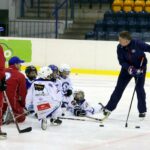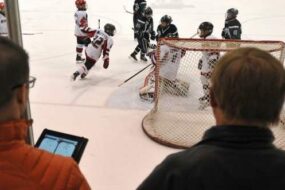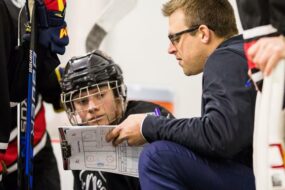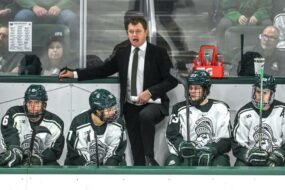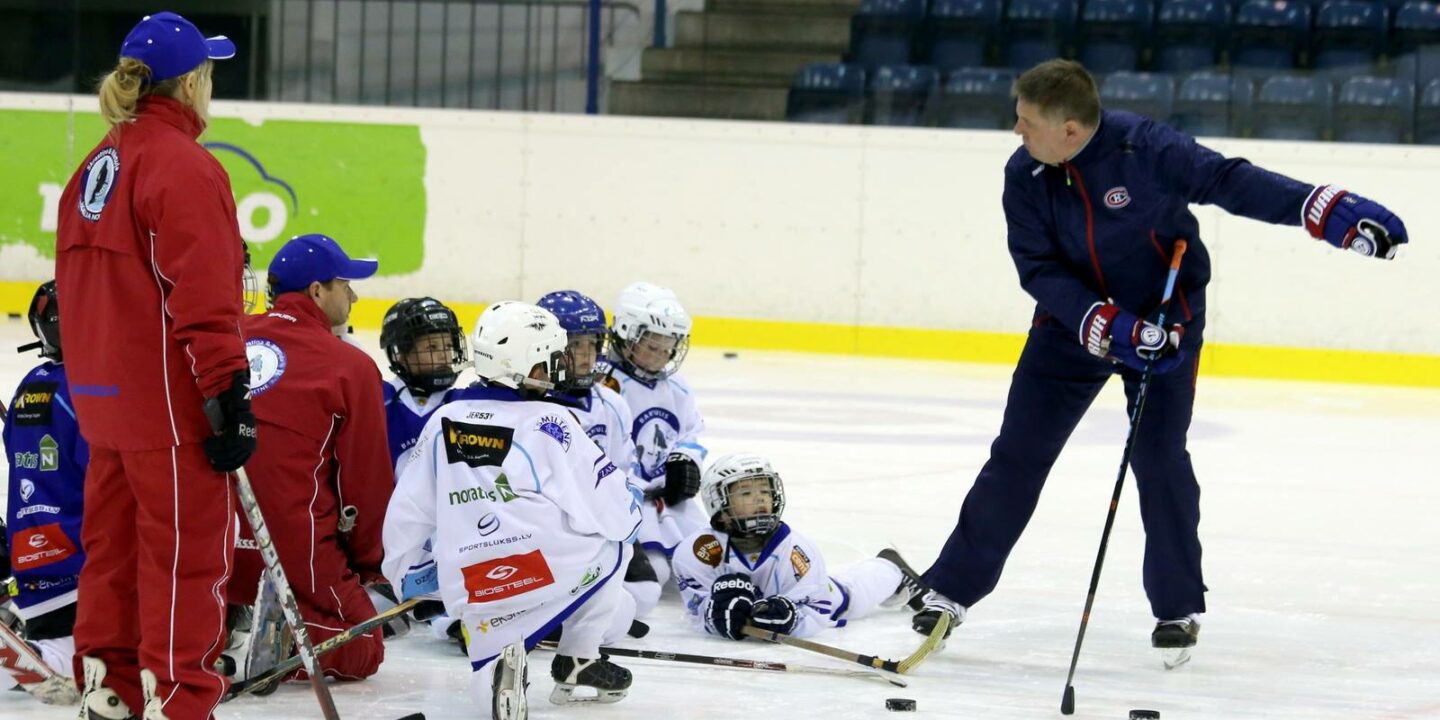
Great hockey relies on exceptional coaching.
The characteristics discussed in this article may seem obvious, as they are crucial for optimizing any professional working relationship. However, the true essence of coaching transcends the individual traits. It is only when these characteristics seamlessly work together that a coach becomes truly outstanding.
The goal of this article is to shed light on the paramount coaching traits. As a result, it will outline the ideal structure of a coaching relationship to achieve optimal outcomes.
Every effective coaching relationship must initiate with a fundamental component of any connection: honesty. This honesty should consistently be positive, emphasizing the importance of genuine and diplomatic interpersonal skills. It doesn’t entail fabricating positivity but rather mastering the art of diplomacy in interactions.
Then there are other coaching characteristics that should be built upon this foundation of honesty:
- Positivity
- Trust
- Role modelling
- Focus
- Knowledge
- Assertion
These are the essential traits of an outstanding hockey coach, applicable across all aspects of hockey development, including skills, strength, and psychological aspects.
The neglect of these characteristics within the hockey industry stands out as one of its most significant shortcomings. This assertion is based on the belief that if exceptional coaching were the norm, we wouldn’t witness misleading marketing, debunked myths, or individuals masquerading as coaches selling gadgets instead of genuine performance tools.
To aspire to greatness as a coach, join me for a moment as we delve into an analysis of the six characteristics that will distinguish you from the rest.
Positivity
In the coach-athlete relationship, every hockey player brings unique skills, abilities, environments, stressors, and circumstances. A one-size-fits-all approach is inadequate. From the outset of the coaching process, the hockey coach’s objective is to generate momentum for the athlete’s progression.
The coach must cultivate an atmosphere of positive energy and sustain it throughout the inherently non-linear progression journey. Every athlete experiences highs and lows, and it’s crucial to maintain a positive environment while addressing mistakes or plateaus effectively.
Effective coaching involves maintaining a positive demeanor while addressing errors, assessing client weaknesses, and offering constructive criticism. Although it may seem contradictory to some, fostering a positive environment is essential for executing these challenging coaching tasks meaningfully.
For the client to be receptive to feedback on weaknesses or critiques, they must sense an overall positive and beneficial energy. Thus, whether the coach’s feedback is critical or corrective, the hockey player receives it understanding that the coach is supportive.
If, upon initial assessment, the coach senses that authentic positivity cannot be established, it may be advisable for both the athlete and the coach to reconsider the coaching process entirely.
Throughout my career, there have been instances where I deemed it best not to proceed with a new athlete beyond the initial inquiry. This is a natural occurrence, as not everyone aligns with a specific coaching style.
In hockey, it’s common for a player to thrive under a different coach after struggling with compatibility on a previous team. Achieving and sustaining optimal performance relies on the establishment of a positive working environment.
Trust
In a coaching relationship, trust plays a pivotal role in acknowledging and accepting the non-linear nature of results, progress, and real-life challenges.
Consistency poses varying difficulties for different hockey players, whether due to logistical constraints or the mental and emotional obstacles they confront. For instance, coaching NHL players who extensively travel for the majority of the year presents challenges related to time zones, access to equipment, and maintaining routines amidst unpredictable schedules.
People with substantial responsibilities may be called upon unexpectedly for interviews, appearances, charity events, or impromptu meetings, diverting their focus from personal goals. Athletes who grasp the importance of consistency prioritize planning, preparation, and meeting their needs before others, ensuring a reasonable level of consistency amid disruptions.
It’s crucial to dispel the notion that prioritizing oneself is selfish; rather, it becomes selfish when expecting others to prioritize you. Those who achieve consistency integrate success habits into their daily routines, adapting to external demands without needless regression. Conversely, some individuals knowingly sabotage themselves or underestimate the required structure for substantial goals.
Many hockey players aspire to personal goals without embracing the necessary lifestyle changes, displaying immature thinking that reality eventually unveils. Trusting the process involves understanding that progression is seldom a straightforward journey from Point A to Point B.
Trust operates as a two-way street. Coaches rely on the hockey player’s truthful and honest communication in providing feedback, as well as trust that the prescribed protocols will be diligently applied. A coach should not need constant confirmation of a player’s adherence to instructions, as coaching is not akin to babysitting. Both parties must fulfill their roles, recognizing individual differences in following instructions and motivation levels.
Ultimately, trust lies in the commitment of the hockey player to persist with the coach through non-linear progression, understanding that performance, much like life, is non-linear. Mutual trust in each other and the process facilitates emerging as improved versions of oneself.
Role Modelling
Truly exceptional coaches possess various characteristics, and one key trait is their commitment to modeling the same behaviors they expect from their clients.
The coaching approach of “do as I say and not as I do” can inadvertently erode the trust clients place in their coach. On the contrary, when clients perceive that their coach adheres to the same high-performance standards, it fosters trust and motivation, often at a subconscious level. This awareness propels clients further, driven by the coach’s personal commitment.
An effective coach doesn’t merely prescribe a training and nutrition regimen; they serve as an exemplar of discipline and responsibility, showcasing what they expect from their clients. High-level clients benefit not only from tailored programs but also from observing the coach’s actions and habits.
“Walking the way you talk” extends beyond physical aspects to encompass mental and emotional dimensions. A coach’s ability to resonate with clients is enhanced when they’ve personally experienced similar challenges.
Studying and acquiring knowledge is valuable, but true understanding comes from firsthand experience. To genuinely relate to clients, coaches must have been in their shoes. Demonstrating passion for the profession involves applying the principles one prescribes. When coaches align their actions with their words, they inspire clients to mirror the same level of commitment and preparation. A coach’s actions often speak louder than their words, and this should never be underestimated.
Focus
Engaging with a hockey player requires targeted and individualized attention. No two athletes share identical thought processes, life experiences, perspectives, or attitudes.
A great coach prioritizes the athlete and their relationship, placing the prescribed protocol as a secondary consideration, particularly when challenges or external factors impact the client’s motivation.
Coaching should revolve around offering specific and clear advice tailored to the individual. The application of this advice must be unique to the athlete, ensuring it is manageable, measurable, and relevant to their lifestyle.
Rather than constant assessment, a focused coach provides the client with tangible criteria for self-evaluation. This approach allows athletes to execute a system independently, fostering habit change instead of merely adhering to prescriptions.
For instance, I once coached a Junior A hockey player with considerable natural ability but lacked consistency in nutritional and dryland training. To address this, I gave him specific instructions, including daily journaling and accountability for a six-week training phase. This approach provided both short-term and long-term measurable goals without triggering self-sabotage.
Though it demanded additional effort from me, it was a worthwhile investment in his development. The emphasis on regular check-ins proved more crucial than the content, ultimately leading to habit changes and elevated performance standards.
Effective coaching focus means understanding and accommodating a client’s capabilities within their unique lifestyle and challenges. While some elite hockey players naturally adhere to protocols, others may struggle with consistency. A coach’s ability to meet athletes where they are defines the level of specific focus and effectiveness in coaching.
Knowledge
Exemplary coaching goes beyond people skills; it necessitates an in-depth understanding of all facets of hockey performance development. My life’s dedication involves acquiring world-class expertise in hockey-specific domains, including speed, conditioning, agility, functional strength, nutritional support, and sports psychology.
While a coach’s intentions may be admirable, I often witness subpar training and nutrition plans distributed by individuals lacking formal education and practical experience in sports science. In essence, true coaching prowess demands a level of specificity, often unmet by those without legitimate study.
A proficient hockey trainer should possess comprehensive knowledge in physical, nutritional, and psychological performance development, specifically tailored to hockey. It’s comparable to the notion of a basketball coach from the NBA taking charge of an NHL team—a seemingly absurd scenario. Yet, parents or local boot camp instructors often create programs for hockey players without the necessary expertise.
To address this gap, I developed the world’s first Hockey Training Specialist course. This comprehensive program equips individuals with the tools needed to elevate their knowledge, enabling them to design top-tier hockey programs from scratch. Motivated and committed learners have the opportunity to become true specialists, eliminating guesswork in coaching hockey players to realize their potential.
Athletes bestow greater respect and loyalty upon a coach when they know and feel they are in capable hands. The confidence an athlete has in their coach significantly influences their adherence to the protocol. Furthermore, the coach’s ability to achieve results speaks volumes, emphasizing the importance of effective periodization and program design in shaping successful hockey players.
Assertion
A coach’s effectiveness hinges on their assertiveness, a quality deemed non-negotiable in coaching.
However, it’s crucial to clarify that assertiveness isn’t synonymous with false confidence or being a jerk. True assertiveness is a strength, distinctly different from aggressiveness, which is a weakness.
As a leader, a coach must exhibit assertiveness to maintain a perceived image of strength and capability. This doesn’t mean being bossy but rather being the boss with a strong yet non-demanding presence. Well-executed assertive leadership fosters loyalty and respect from hockey players, creating a sincere connection rather than a role-play scenario.
Assertiveness stems from genuine confidence, cultivated through domain knowledge. Athletes will sense this confidence radiating from the coach, strengthening the bond at an unconscious level and yielding better results for everyone involved.
The Complete Hockey Coaching Solution
The preceding article provides just a glimpse of the essential qualities needed to excel as a coach. However, without pairing these attributes with world-class hockey program design skills, realizing your true potential or that of your hockey athletes may remain elusive.
For those aspiring to master the science of hockey training and seamlessly integrate it with the art of coaching, the Hockey Training Specialist course is the comprehensive blueprint you need. Remarkably, this course stands as the only hockey-specific certification worldwide. Completing it means being among the first and only coaches in your area with this esteemed credential, attracting hockey parents and dedicated athletes to you like a magnet.
Becoming a sought-after hockey coach in your community empowers you to create your own schedule, eliminating the need for the grueling 12–16 hour work shifts that many trainers endure. Furthermore, your athletes will experience transformative changes on the ice, and word of mouth will establish you as the go-to coach for achieving the best results.



